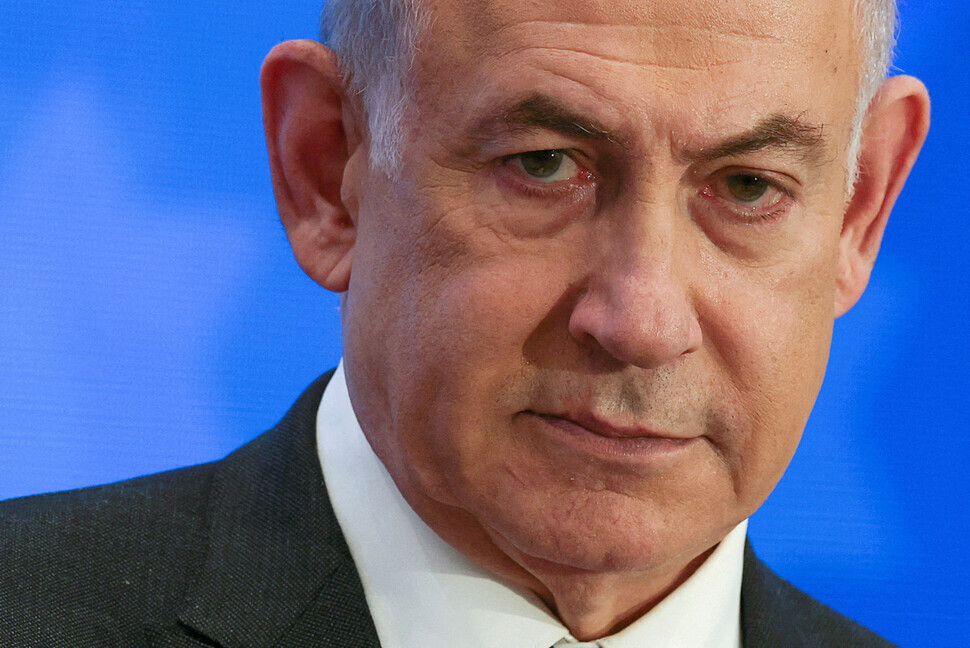hankyoreh
Links to other country sites 다른 나라 사이트 링크
Why Israel isn’t hitting Iran with immediate retaliation

More than three days after being hit with a retaliatory strike by Iran, Israel continued on Wednesday to refrain from carrying out an immediate counterattack.
The decision appeared to reflect a complex mixture of factors, including pressure from the US and other allies that want to avoid escalation as well as the difficulty of carrying out a full-scale strike on Iran without the assistance of neighboring Arab states.
Discussing Iran with reporters on Tuesday, Israel Defense Forces spokesperson Daniel Hagari stressed that Israel would “act at the time and place of our choosing.”
On April 13, Iran launched a first-ever strike on Israeli territory, launching over 300 missiles and drones in an act of retaliation against Israel’s strike on its consulate in Syria.
A meeting of Israel’s war cabinet was subsequently convened, but no clear conclusion has yet been reached.
The US has repeatedly expressed its opposition to the possibility of a counterstrike leading to an escalation of the clash into a full-scale war between Iran and Israel.
Speaking on condition of anonymity, a US official was quoted in an Associated Press report as saying that President Joe Biden had told Israeli Prime Minister Benjamin Netanyahu that the US would not participate in any offensive action by Israel against Iran.
The same official quoted Biden as stressing the need to “think carefully and strategically.”
It’s a situation where a forceful counterattack by Israel could lead to it losing its biggest supporter in the US.
Israel claimed that it had fended off 99% of the drone and missile strikes by Iran, intercepting most of the weapons before they reached its territory. In this case, the US and UK armed forces took part in shooting down the Iranian drones, while neighboring Arab states also provided assistance.
The US Central Command (CENTCOM), which oversees the Middle East region, has cooperated with countries like Jordan and Saudi Arabia in responding to Iran.
Quoting an unnamed Israeli air force official, the AP explained that Israel’s fighter aircraft had to fly through eastern regions to intercept Iranian missiles, which would have necessitated assistance from Jordan — which borders Israel to the east — and from Saudi Arabia.
Under these circumstances, Israel could find itself in an awkward position if it attempts a counterstrike against Iran on its own.
Yoel Guzansky, a senior researcher at the Tel Aviv-based Institute for National Security Studies, suggested that Israel can “take advantage” and “buy itself a lot of credit right now” if it does not launch a massive retaliatory attack against Iran at a time when it has been facing criticisms from the international community over the war in Gaza.
“But if it does attack, a lot of credit is lost,” he warned.
There’s also the fact that, realistically speaking, Israel would have a hard time carrying out a substantial counterstrike on Iran, which is situated roughly 2,000 kilometers away from Israel, without the help of its neighbors. For Israel to land a missile strike on Iranian territory, it would have to receive authorization for the missile to pass through Saudi Arabia’s air space, which is unlikely to happen.
While Sunni-majority Saudi Arabia may not see eye-to-eye with Shiite-majority Iran, being seen as taking Israel’s side would also pose a burden for it.
For this reason, some have surmised that Israel may limit its response to “shadow warfare,” such as by carrying out an attack on Iran-backed militant groups or carrying out a cyberattack on Iran’s nuclear facilities.
It’s also likely that the prevailing domestic public opinion that Israel needs to respond in concert with friendly nations is part of the Israeli government’s calculus. According to the results of a poll released on Tuesday by the Hebrew University of Jerusalem, 74% of respondents opposed an Israeli counterattack on Iran if it would hurt its alliances.
By Noh Ji-won, staff reporter
Please direct questions or comments to [english@hani.co.kr]

Editorial・opinion
![[Editorial] Yoon must halt procurement of SM-3 interceptor missiles [Editorial] Yoon must halt procurement of SM-3 interceptor missiles](https://flexible.img.hani.co.kr/flexible/normal/500/300/imgdb/child/2024/0501/17145495551605_1717145495195344.jpg) [Editorial] Yoon must halt procurement of SM-3 interceptor missiles
[Editorial] Yoon must halt procurement of SM-3 interceptor missiles![[Guest essay] Maybe Korea’s rapid population decline is an opportunity, not a crisis [Guest essay] Maybe Korea’s rapid population decline is an opportunity, not a crisis](https://flexible.img.hani.co.kr/flexible/normal/500/300/imgdb/original/2024/0430/9417144634983596.jpg) [Guest essay] Maybe Korea’s rapid population decline is an opportunity, not a crisis
[Guest essay] Maybe Korea’s rapid population decline is an opportunity, not a crisis- [Column] Can Yoon steer diplomacy with Russia, China back on track?
- [Column] Season 2 of special prosecutor probe may be coming to Korea soon
- [Column] Park Geun-hye déjà vu in Yoon Suk-yeol
- [Editorial] New weight of N. Korea’s nuclear threats makes dialogue all the more urgent
- [Guest essay] The real reason Korea’s new right wants to dub Rhee a founding father
- [Column] ‘Choson’: Is it time we start referring to N. Korea in its own terms?
- [Editorial] Japan’s rewriting of history with Korea has gone too far
- [Column] The president’s questionable capacity for dialogue
Most viewed articles
- 1Months and months of overdue wages are pushing migrant workers in Korea into debt
- 2[Guest essay] Maybe Korea’s rapid population decline is an opportunity, not a crisis
- 3Dermatology, plastic surgery drove record medical tourism to Korea in 2023
- 4Under conservative chief, Korea’s TRC brands teenage wartime massacre victims as traitors
- 5[Column] Can Yoon steer diplomacy with Russia, China back on track?
- 6First meeting between Yoon, Lee in 2 years ends without compromise or agreement
- 7“Korea is so screwed!”: The statistic making foreign scholars’ heads spin
- 8[Editorial] Japan’s rewriting of history with Korea has gone too far
- 9Two factors that’ll decide if Korea’s economy keeps on its upward trend
- 10[Column] For K-pop idols, is all love forbidden love?